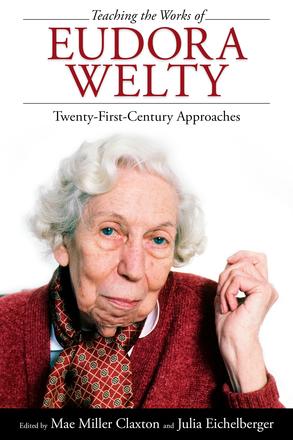
Teaching the Works of Eudora Welty
Twenty-First-Century Approaches
Thoughtful, practical essays on teaching a Pulitzer Prize–winning writer’s work to a wide range of classes
Description
Contributions by Jacob Agner, Sharon Deykin Baris, Carolyn J. Brown, Lee Anne Bryan, Keith Cartwright, Stuart Christie, Mae Miller Claxton, Virginia Ottley Craighill, David A. Davis, Susan V. Donaldson, Julia Eichelberger, Kevin Eyster, Dolores Flores-Silva, Sarah Gilbreath Ford, Stephen M. Fuller, Dawn Gilchrist, Rebecca L. Harrison, Casey Kayser, Michael Kreyling, Ebony Lumumba, Suzanne Marrs, Pearl Amelia McHaney, David McWhirter, Laura Sloan Patterson, Harriet Pollack, Gary Richards, Christin Marie Taylor, Annette Trefzer, Alec Valentine, Adrienne Akins Warfield, Keri Watson, and Amy Weldon
Too often Eudora Welty is known to the general public as Miss Welty, a "perfect lady" who wrote affectionate portraits of her home region. Yet recent scholarship has amply demonstrated a richer complexity. Welty was an innovative artist with cosmopolitan sensibilities and progressive politics, a woman who maintained close friendships with artists and intellectuals throughout the world, a writer as unafraid to experiment as she was to level her pen at the worst human foibles.
The essays collected in Teaching the Works of Eudora Welty seek to move Welty beyond a discussion of region and reflect new scholarship that remaps her work onto a larger canvas. The book offers ways to help twenty-first-century readers navigate Welty's challenging and intricate narratives. It provides answers to questions many teachers will have: Why should I study a writer who documents white privilege? Why should I give this "regional" writer space on an already crowded syllabus? Why should I teach Welty if I do not study the South? How can I help my students make sense of her modernist narratives? How can Welty's texts help me teach my students about literary theory, about gender and disability, about cultures and societies with which my students are unfamiliar?
Reviews
"The collection will no doubt prove an invaluable resource to writers, teachers, and scholars in an array of fields."
- Shannon Draucker, Eudora Welty Review
"Teaching the Works of Eudora Welty provides twenty-first-century instructors with a host of mentors and colleagues. Any reader of Welty's work will benefit from the lessons so generously shared."
- Joan Wylie Hall, The Southern Register
"This collection makes a much-needed and very valuable contribution to Welty studies, and beyond that, to southern, women's and gendered, and American literature. To date, there has been no volume quite like this. These interpretations, by prominent Welty scholars, assist us in working through the writer's more opaque passages, while reminding us, in great detail, of her soaring artistry and enduring value."
- John Wharton Lowe, Barbara Methvin Professor at the University of Georgia and author of Calypso Magnolia: The Crosscurrents of Caribbean and Southern Literature
"This new volume provides a welcome addition to the field of Welty studies. There is no other collection with this particular focus--ways of teaching Welty's works--and the breadth of approaches, connections, and pedagogies this volume includes makes it valuable to teachers at a wide range of institutions. Any work that increases the teaching of Welty's fiction and essays in high school, college, and beyond is a great boon to our cultural education."
- Suzan Harrison, vice president for academic affairs and dean of faculty at Eckerd College and recipient of the Phoenix Award for outstanding contributions to the field of Welty studies